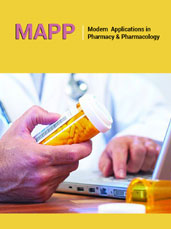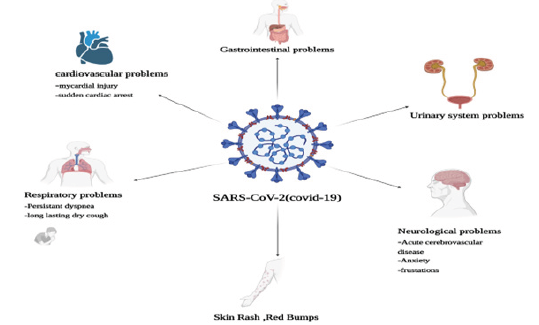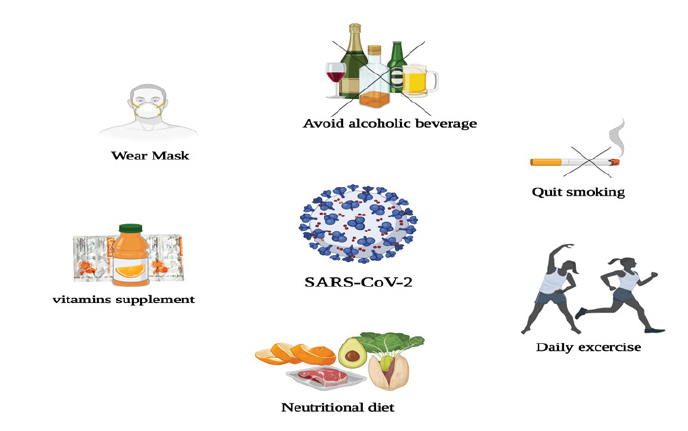- Submissions

Full Text
Modern Applications in Pharmacy & Pharmacology
SARS-CoV-2: Complications after Recovering Covid-19 and its Precautions
Afsar S Pathan and Pankaj G Jain*
Department of Pharmacology, India
*Corresponding author: Pankaj G Jain, Department of Pharmacology, India
Submission: April 28, 2022;Published: May 19, 2022

ISSN 2637-7756Volume3 Issue1
Introduction
Figure 1:Post covid-19 complications with multiple organs

COVID-19 is largely a viral infection of the respiratory tract caused by SARS-CoV-2. The vast spectrum of clinical signs associated with the involvement of numerous organs in SARSCoV- 2 patients is now considered a systemic infection due to the vast spectrum of clinical signs associated with the involvement of numerous organs in SARS-CoV-2 patients. COVID- 19’s immediate consequences are well known and frequently associated with a greater risk of death. However, delayed or long-term COVID-19 problems are becoming more prevalent and are associated with greater morbidity [1]. A rapidly developing corpus of literature exists on the clinical manifestations and therapy of COVID-19’s acute phase. Common features of the early stage of COVID-19 are fever, musculoskeletal symptoms, dry cough, and shortness of breath, digestive problems, and anosmia [2]. A general deterioration in quality of life has been seen for as long as one year after a significant corona virus epidemic. Several long-term clinical complications have been reported that affect various aspects of health, including chronic fatigue, reduced muscle weakness, increased depression and anxiety, Post-Traumatic Stress Disorder (PTSD), and sleep problems [3]. People in their elderly years of life and those with major health conditions such as diabetes, immunological disorders, cancer, or chronic diseases are at risk of suffering post-COVID complications (Figure 1). “Long Covid” or “long-haul Covid” refers to these post-Covid health issues or complications. In these cases, a patient’s symptoms of the disease persist for four weeks after the initial recovery. Modifications in the phathophysiology of the SARS-CoV-2 virus, inflammatory damage, and immunologic anomalies in COVID-19 are all possible paths that could contribute to post-COVID-19 problems (Figure 2). Severe COVID-19 survivors may experience problems with their numerous multiorgan systems [4]..
Figure 2:Precautions for post covid-19.

Precautions
i. Patients should be advised to eat a well-balanced diet, get
enough sleep, restrict their alcohol intake, and quit smoking.
ii. Patients with prolonged heart symptoms should be
continuously in touch with cardiologist and avoid heavy
exercise.
iii. Avoid to crowd places and wear mask
iv. Add nutritional diet in daily diet
v. Drink plenty of fluids
vi. Avoid alcohol and tobacco
vii. Take vitamins supplementation
viii. Daily exercise for 10-15min.
References
- Chippa Venu, Abdul Aleem, Fatima Anjum (2021) Post-acute coronavirus (COVID-19) syndrome. Nat Med 27(4): 601-615.
- Shanbehzadeh S, Tavahomi M, Zanjari N, Ebrahimi Takamjani I (2020) Since January 2020 Elsevier has created a covid-19 resource centre with free information in English and mandarin on the novel coronavirus covid-19. The covid-19 resource centre is hosted on Elsevier connect, the company ’s public news and information.
- Ahmed H, Kajal P, Darren CG, Stephen H, Penny L, et al. (2020) Long-term clinical outcomes in survivors of Severe Acute Respiratory Syndrome (SARS) and Middle East Respiratory Syndrome (MERS) coronavirus outbreaks after hospitalisation or ICU admission: A systematic review and meta-analysis. J Rehabil Med 52(5).
- András Zóka GB (2020) Since January 2020 Elsevier has created a COVID-19 resource centre with free information in English and Mandarin on the novel coronavirus COVID. Ann Oncol, pp. 19-21.
© 2022 Pankaj G Jain. This is an open access article distributed under the terms of the Creative Commons Attribution License , which permits unrestricted use, distribution, and build upon your work non-commercially.
 a Creative Commons Attribution 4.0 International License. Based on a work at www.crimsonpublishers.com.
Best viewed in
a Creative Commons Attribution 4.0 International License. Based on a work at www.crimsonpublishers.com.
Best viewed in 







.jpg)






























 Editorial Board Registrations
Editorial Board Registrations Submit your Article
Submit your Article Refer a Friend
Refer a Friend Advertise With Us
Advertise With Us
.jpg)






.jpg)














.bmp)
.jpg)
.png)
.jpg)










.jpg)






.png)

.png)



.png)






